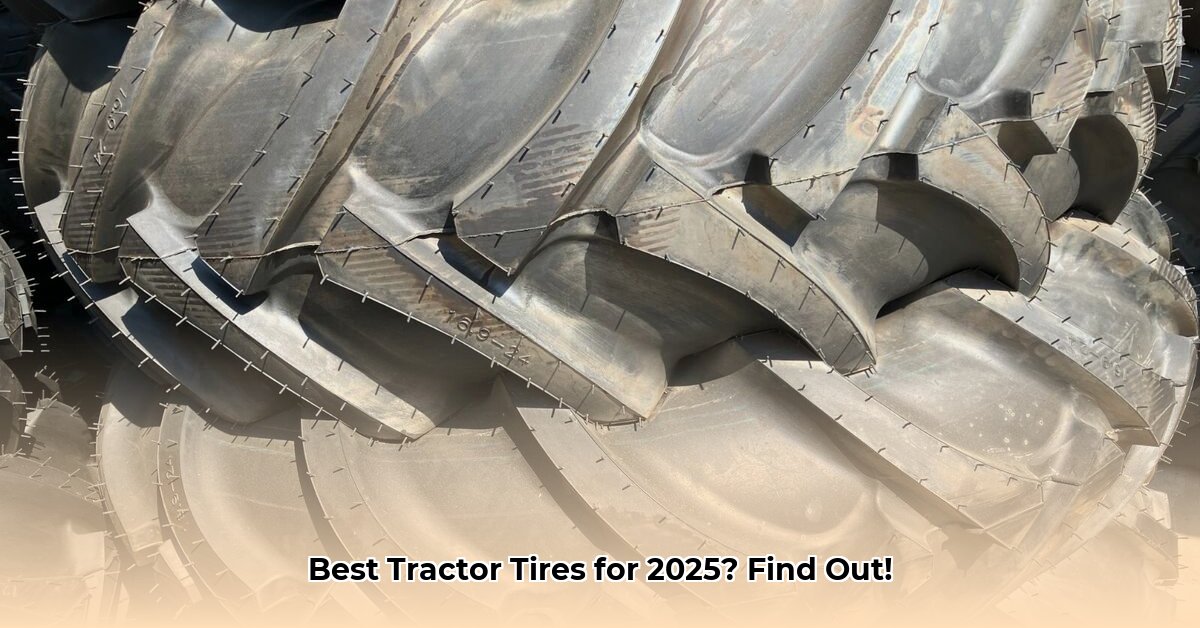
Finding the right 16.9 x 24 tractor tires can feel overwhelming. This guide simplifies the process, equipping you with the knowledge to make informed, sustainable choices. We'll cover everything from sourcing reliable suppliers to implementing effective maintenance strategies, ensuring your tires deliver peak performance while minimizing environmental impact. For more detailed specs, check out this helpful resource on 16.9 x 24 tires.
Understanding 16.9 x 24 Tractor Tires: More Than Just a Number
The 16.9 x 24 designation refers to the tire's section width (16.9 inches) and rim diameter (24 inches). However, variations exist in construction, materials (like rubber compounds), and tread patterns, significantly affecting performance and lifespan. Consider your typical workload: heavy hauling requires different tire characteristics than light tillage. New tires offer guaranteed quality and longer warranties, while used tires present a cost-saving option (but with higher risk). Understanding these differences is critical for making an informed purchase.
Finding Reliable Suppliers: Navigating the Market
The tractor tire market encompasses a vast range of suppliers – some reputable, others less so. Follow these steps to ensure you're dealing with trustworthy vendors:
Online Research: Begin your search online. Don't solely focus on price; thoroughly examine customer reviews. Negative reviews, especially recurring themes, should raise red flags. Look for suppliers with consistent positive feedback regarding prompt delivery and helpful customer support.
Local Dealerships: Engage with local agricultural equipment dealers. They offer valuable expertise, personalized advice, and often provide superior warranty support. Building a strong relationship is a long-term investment.
Brand Recognition: Prioritize well-known brands with established reputations for quality and durability. This minimizes the risk of counterfeit tires, saving you from potential breakdowns and costly repairs.
Comparative Pricing: Obtain multiple quotes. Consider not only the initial cost but also warranty details, delivery charges, and potential hidden fees. A slightly higher price might be justified by superior warranties or faster shipping.
Counterfeit Awareness: Be vigilant about counterfeit tires. These can appear authentic but lack the quality and safety of genuine products. Look for certification marks and ensure the supplier is an authorized dealer for the brand.
Tire Maintenance and Lifespan: Extending Your Investment
Proper maintenance significantly extends tire lifespan, reducing downtime and costs. Adhere to these practices:
Regular Inflation Checks: Maintain the correct tire pressure as specified in your tractor's manual. Underinflation accelerates wear, while overinflation can damage the tire.
Visual Inspections: Regularly inspect tires for cuts, embedded objects, or unusual wear patterns. Early detection prevents minor issues from escalating into major problems.
Proper Storage: When storing tires, keep them clean and inflated to the recommended pressure, away from direct sunlight and extreme temperatures. This helps maintain tire integrity.
Sustainable Sourcing: Environmentally Conscious Choices
Sustainability is paramount. Consider these eco-friendly practices when selecting tires:
Manufacturer Practices: Research manufacturers committed to ethical and sustainable production methods. Look for certifications and information showcasing their commitment to reduced environmental impact.
Tire Recycling: Inquire about tire recycling options in your area. Responsible disposal reduces environmental harm and is crucial for closing the loop.
Fuel Efficiency: Opt for low rolling resistance tires to improve fuel economy, lowering operational costs and reducing your carbon footprint.
Advocating for Industry Improvement: Your Role in Change
The tractor tire industry can benefit from increased standardization and transparency. You can contribute to positive change by:
Feedback: Share your experiences – positive and negative – with manufacturers and vendors. Your feedback helps shape future practices and designs.
Industry Support: Support initiatives aimed at enhancing tire quality, promoting sustainable manufacturing, and improving labeling standards.
Transparency Demand: Insist on detailed information about tire specifications, manufacturing processes, and environmental impacts.
Conclusion: Informed Choices for a Sustainable Future
Making informed decisions about 16.9 x 24 tractor tires is crucial for both economic and environmental sustainability. By following this guide, you can ensure you are sourcing high-quality, durable tires while minimizing your environmental impact. Remember, a proactive approach to sourcing, maintenance, and advocacy helps shape a more sustainable future for agriculture.